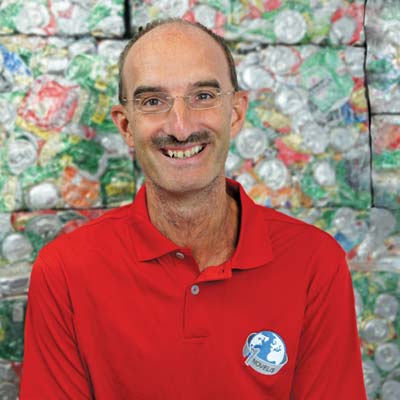Atlanta-based Novelis, Inc. is a leading global producer of rolled aluminum products for the automotive, packaging, electronics and other markets. The company recycles billions of aluminum cans annually and has set ambitious goals for using ever-increasing amounts of recycled aluminum in its production processes. On June 12, American Metal Market, an industry publication, recognized Novelis with the award for Environmental Responsibility and Stewardship at its first Awards for Aluminum Excellence ceremony in New York. John Gardner is Novelis’ chief sustainability officer, a role he added in January 2011 to his duties as vice president, human resources and communications. Site Selection Editor Mark Arend spoke with Mr. Gardner the week Novelis won its sustainability award:
Site Selection: What did you understand the role to mean at the time you were appointed CSO, and how has that played out?
John Gardner: Prior to January 2011, we were doing many of the same things, just not with an organized, thought-through approach to sustainability. Our approach to sustainability is probably pretty similar to that of many other companies. We’re looking at people, environment and the economic side, trying to have a balanced approach both short term and long term on those factors. It’s not just about the environment — we’re looking at the social and economic sides as well. It’s important that we understand internally that Novelis needs to grow and make money, because if we don’t, we won’t be sustainable. We only wanted to do sustainability if we were going to be serious about it, that it’s part of our business strategy — that it’s for sound business reasons, and not just for some PR or for compliance reasons. That was our approach from the start.
SS: Novelis is part of a rather industrial sector, which brings additional challenges to the CSO role. What are your main challenges in this area?
JG: Obviously businesses are different — retail, services, manufacturing. A lot of our competitors in the aluminum sector would primarily be mining and primary aluminum companies and focused on the upstream side of those activities. We are more focused on our overall life cycle and how our products will be used. We don’t have those big upstream mining and primary aluminum facilities. We are very efficient in the operation of our manufacturing sites, and we’re pushing to do even better. Our focus is really on making sure our products are sustainable for the future and giving our customers real benefit over the life cycle. We are operating globally, and we need to be very mindful that there are different sustainability issues and focuses in different part of the world.
SS: Can you share an example of implementing a sustainability policy that has had tangible results and is now being implemented elsewhere at Novelis?
JG: After we looked at our overall sustainability and business issues, we decided to set 10 initial sustainability targets, which are pretty ambitious goals for the future. We were historically about 33 percent coming from recycled material, and we’ve set ourselves a very challenging target of raising that to 80 percent by 2020. We’re fundamentally changing our whole business to one based on using recycled materials compared to using primary materials today. That’s a huge change for our business and will give us and our customers massive environmental footprint benefits. That has big implications for our second big target, which is to reduce our greenhouse gases and carbon emissions by roughly half. We are looking to take out 10 million metric tons of greenhouse gases by 2020, which is very significant for us and our customers, making sure we have long-term, carbon-competitive products. It is a long-term target, up to 2020, but we’ve made some real progress already. After only 10 months, we were at 33 percent [recycled] for fiscal year 2011, and we have just announced that in fiscal year 2012 we’ve moved up 6 percentage points to 39 percent. We’re pretty happy with that. We’re making some very serious capital investment to do that. We’ve announced major new recycling capability in Korea to serve Asia, in Brazil to cover South America and on three occasions in Europe, including one at a plant in eastern Germany, which will be world’s largest aluminum recycling center in the world. All of those steps will help us become the world’s largest aluminum recycler.
SS: Where do you draw guidance or inspiration from as CSO in a field that is relatively new?
JG: I’ve been with the company more than 25 years and have good relationships with many of our big customers and what they are thinking. It was very important to understand what was happening in the rest of the world in terms of sustainability, so we have looked at other companies doing good work in this area — DuPont and BMW, for instance. We have talked with some interesting NGOs, like the World Wildlife Fund and Friends of the Earth, to start a dialogue and learn their positions on the issues. Getting external perspective is very important. One way we’re doing that is with an external sustainability council, where we have recruited five people with real, global expertise in sustainability leadership.
SS: How do you think the role of CSO will evolve in the next few years?
JG: We are absolutely trying to do the right thing. Our leadership team has been so supportive of integrating sustainability into our business strategy. We are very eager to improve. We know we have areas in which to improve, but I am very excited that the whole company is moving in this direction and that people do understand the long-term value of sustainability and how it is important for our long-term business. Things will evolve as business circumstances change, but our focus is to keep improving sustainability measures to our benefit and that of our customers and stakeholders.
